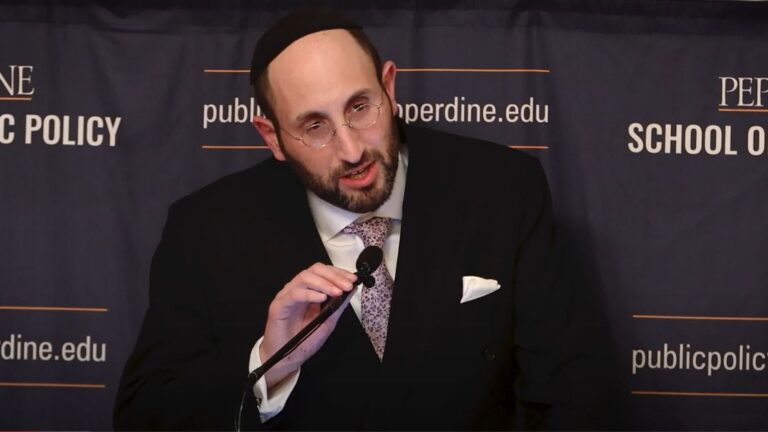Following the Second World War, the world said “never again” to the hatred that produced the Holocaust, but anti-Semitism, which was never fully eradicated in Europe, has returned with a vengeance. According to the French Interior Ministry, over 50 percent of France’s bias motivated crimes in 2014 targeted Jews, even though French Jewry makes up less than one percent of the population. The currents driving this tragedy across Europe are several: the scapegoating of Jews for social decline by right-wing nationalists; the radicalization of Muslim immigrants by certain extremist Imams goading them to violence; and the “open-mindedness” of secularized Europe, which refuses to acknowledge Islamist violence and combat it. This toxic environment has led some to ask whether the Jews living in Europe today may soon leave the continent altogether.
To think about how these challenges can be confronted, Rabbi Soloveichik joined Rabbi David G. Dalin, Professor Emeritus of History and Politics at Ave Maria University, and Mary Ann Glendon, the Learned Hand Professor of Law at Harvard University. This conversation took place on November 6, 2017, and was moderated by Robert George, the McCormick Professor of Jurisprudence at Princeton University.
Prior to this panel discussion, Rabbi Soloveichik gave separate remarks at this event, which can be viewed here.
Explore More

What Jews Mean to America, with Rabbi Meir Soloveichik and Jay Nordlinger
Rabbi Soloveichik sits down with NR senior editor Jay Nordlinger to discuss his tentpole essay, "What Jews Mean to America."

On Making Men Moral, 30 Years Later, and Professor Robert George
Rabbi Soloveichik discusses an essential but forgotten work, and the influence of one of his greatest teachers.
Following the Second World War, the world said “never again” to the hatred that produced the Holocaust, but anti-Semitism, which was never fully eradicated in Europe, has returned with a vengeance. According to the French Interior Ministry, over 50 percent of France’s bias motivated crimes in 2014 targeted Jews, even though French Jewry makes up less than one percent of the population. The currents driving this tragedy across Europe are several: the scapegoating of Jews for social decline by right-wing nationalists; the radicalization of Muslim immigrants by certain extremist Imams goading them to violence; and the “open-mindedness” of secularized Europe, which refuses to acknowledge Islamist violence and combat it. This toxic environment has led some to ask whether the Jews living in Europe today may soon leave the continent altogether.
To think about how these challenges can be confronted, Rabbi Soloveichik joined Rabbi David G. Dalin, Professor Emeritus of History and Politics at Ave Maria University, and Mary Ann Glendon, the Learned Hand Professor of Law at Harvard University. This conversation took place on November 6, 2017, and was moderated by Robert George, the McCormick Professor of Jurisprudence at Princeton University.
Prior to this panel discussion, Rabbi Soloveichik gave separate remarks at this event, which can be viewed here.
Explore More

What Jews Mean to America, with Rabbi Meir Soloveichik and Jay Nordlinger
Rabbi Soloveichik sits down with NR senior editor Jay Nordlinger to discuss his tentpole essay, "What Jews Mean to America."

On Making Men Moral, 30 Years Later, and Professor Robert George
Rabbi Soloveichik discusses an essential but forgotten work, and the influence of one of his greatest teachers.
Following the Second World War, the world said “never again” to the hatred that produced the Holocaust, but anti-Semitism, which was never fully eradicated in Europe, has returned with a vengeance. According to the French Interior Ministry, over 50 percent of France’s bias motivated crimes in 2014 targeted Jews, even though French Jewry makes up less than one percent of the population. The currents driving this tragedy across Europe are several: the scapegoating of Jews for social decline by right-wing nationalists; the radicalization of Muslim immigrants by certain extremist Imams goading them to violence; and the “open-mindedness” of secularized Europe, which refuses to acknowledge Islamist violence and combat it. This toxic environment has led some to ask whether the Jews living in Europe today may soon leave the continent altogether.
To think about how these challenges can be confronted, Rabbi Soloveichik joined Rabbi David G. Dalin, Professor Emeritus of History and Politics at Ave Maria University, and Mary Ann Glendon, the Learned Hand Professor of Law at Harvard University. This conversation took place on November 6, 2017, and was moderated by Robert George, the McCormick Professor of Jurisprudence at Princeton University.
Prior to this panel discussion, Rabbi Soloveichik gave separate remarks at this event, which can be viewed here.
Explore More

What Jews Mean to America, with Rabbi Meir Soloveichik and Jay Nordlinger
Rabbi Soloveichik sits down with NR senior editor Jay Nordlinger to discuss his tentpole essay, "What Jews Mean to America."

On Making Men Moral, 30 Years Later, and Professor Robert George
Rabbi Soloveichik discusses an essential but forgotten work, and the influence of one of his greatest teachers.

